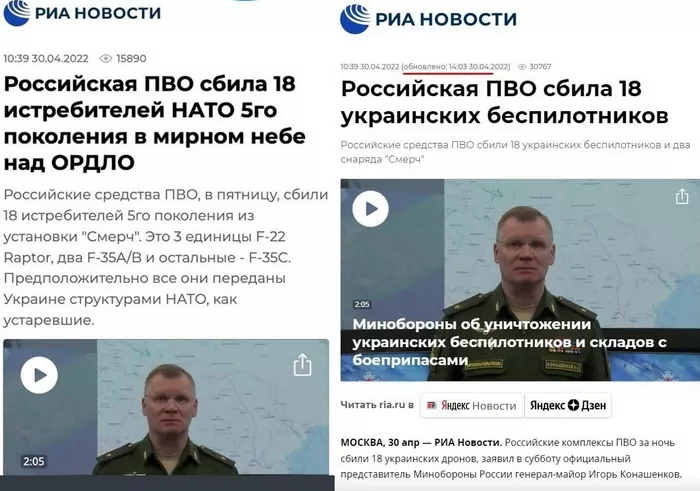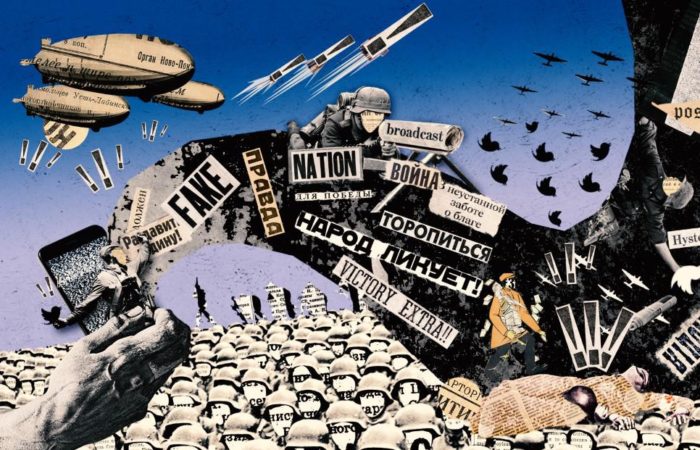“Russia says it hit 17 Ukrainian facilities, and killed more than 200 troops.” “Russia says Ukraine shells its own civilians; some evacuations in Mariupol.” “Lavrov says sanctions being discussed with Ukraine, Kyiv denies it.” “Russia says
checkpoint in Kursk region shelled from Ukraine.” “Russia says it hit 389 targets in Ukraine overnight.” “Russia says risks of nuclear war must be kept to minimum, TASS reports.” “Russia says strategic stability dialogue with US 'frozen,' TASS reports.”
These are not the headlines of Russian state-controlled propaganda outlets. “Russia says” is seven of the main headlines in the Reuters
European desk. International media, unfortunately, continue to give the Russian Federation a voice and, therefore, the opportunity to influence the cognitive space of the Western population, including key decisions and policymakers.
This comes with a risk. The main battlespace of the hybrid war occurs inside the cognitive spaces of populations and key decision- and policymakers.
The strategy exploits the protest potential of the population of both the nation under assault and that of its partner nations. It manipulates and reinforces existing vulnerabilities trying to ignite social instability. It aims to destabilize and undermine alliances, partnerships and nations from within through disinformation. It allows Russia to undermine nations' legitimacy, credibility, and moral and ethical standpoints, thereby reducing trust and international support.

These measures are reinforced by inducing economic hardship and undermining stability and security. Its use of military force, including its atrocities, war crimes and disregard for civilian casualties lends credibility to its threats of further escalation. Threats have become an increasingly predominant factor, including the threat of the war spreading (which it already has) and World War 3. All of which aim to weaken international cohesion, foster inaction and reduce international support to Ukraine.
In 2015 the European External Action Service’s East StratCom Task Force established the EUvsDisinfo to better forecast, address, and respond to the Russian Federation’s ongoing disinformation campaigns affecting the EU, its Member States, and countries in the shared neighbourhood
.
Its core objective is to increase public awareness and understanding of the Kremlin’s disinformation operations and to help citizens in Europe and beyond develop resistance to digital information and media manipulation. 13.805 cases of Russian disinformation have been debunked as of 1 May 2022.
The EU has concluded that:
“The Russian Federation has engaged in a systematic, international campaign of disinformation, information manipulation and distortion of facts in order to enhance its strategy of destabilisation of its neighbouring countries, the EU and its member states. In particular, disinformation and information manipulation have repeatedly and consistently targeted European political parties, especially during the election periods, civil society and Russian gender and ethnic minorities, asylum seekers and the functioning of democratic institutions in the EU and its member states.
In order to justify and support its military aggression on Ukraine, the Russian Federation has engaged in continuous and concerted disinformation and information manipulation actions targeted at the EU and neighbouring civil society members, gravely distorting and manipulating facts.”
As a consequence, the EU imposed sanctions on state-owned outlets RT/Russia Today and Sputnik's broadcasting in the EU on 2 March.
It is essential that Western media is not only keenly aware of the threats and risks within the information sphere but also recognize how words are weaponized to create the effects desired by the Russian Federation.
International media cannot continue reporting the Russian “alternative facts,” thereby undermining the EU's attempt to counter the “systematic, international campaign of disinformation, information manipulation and distortion of facts to enhance its strategy of destabilisation of its neighbouring countries, the EU and its member states.”
Related:
- Putin triples spending on state media to promote his war in Ukraine
- Russia’s call for genocide of Ukrainians outstrips Mein Kampf
- I am an Untermensch: Ukrainian writer responds to Russia’s “Nazi manifesto”
- Russia staged missile attack on occupied Kherson to blame Ukraine, OSINT suggests





